考研英语写作30篇范文:安乐死
考研英语写作30篇范文:安乐死
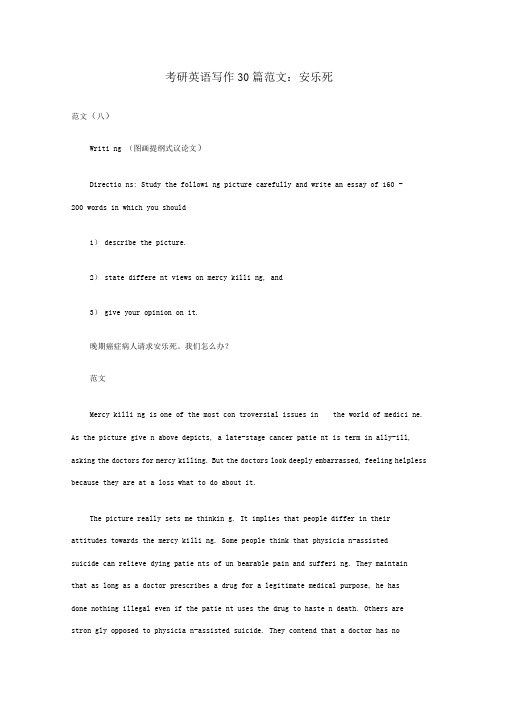
考研英语写作30篇范文:安乐死范文(八)Writi ng (图画提纲式议论文)Directio ns: Study the followi ng picture carefully and write an essay of 160 -200 words in which you should1)describe the picture.2)state differe nt views on mercy killi ng, and3)give your opinion on it.晚期癌症病人请求安乐死。
我们怎么办?范文Mercy killi ng is one of the most con troversial issues in the world of medici ne. As the picture give n above depicts, a late-stage cancer patie nt is term in ally-ill, asking the doctors for mercy killing. But the doctors look deeply embarrassed, feeling helpless because they are at a loss what to do about it.The picture really sets me thinkin g. It implies that people differ in theirattitudes towards the mercy killi ng. Some people think that physicia n-assistedsuicide can relieve dying patie nts of un bearable pain and sufferi ng. They maintainthat as long as a doctor prescribes a drug for a legitimate medical purpose, he hasdone nothing illegal even if the patie nt uses the drug to haste n death. Others arestron gly opposed to physicia n-assisted suicide. They contend that a doctor has noright to give a patient sufficient medication to control his pain if that may hasten death. They conclude that it is illegal for doctors to help the dying end their lives.As far as I'm concerned, doctors have a duty to help dying patients to alleviate their pain and suffering. I also agree that doctors deserve to be punished if theyprolong the needless suffering of their terminally-ill patients. In short, I am infavor of mercy killing. (207 words)译文:安乐死是医学界最有争议的问题之一。
对安乐死的看法 英语作文

对安乐死的看法英语作文Title: Contemplating Euthanasia: A Moral Exploration。
Euthanasia, commonly referred to as "assisted suicide" or "mercy killing," is a topic that evokes strong emotions and moral dilemmas. Advocates argue for the right to end suffering with dignity, while opponents raise concerns about the sanctity of life and the potential for abuse. In this essay, we will delve into the multifaceted aspects of euthanasia, examining its ethical implications and societal impacts.First and foremost, proponents of euthanasia advocate for individual autonomy and the right to die with dignity. They argue that individuals facing terminal illness or unbearable suffering should have the choice to end their lives peacefully, rather than enduring prolonged agony. From a utilitarian perspective, euthanasia can be seen as a compassionate act that minimizes overall suffering, bothfor the patient and their loved ones. Moreover, proponentsemphasize the importance of respecting patients' autonomy and their right to make decisions about their own bodies and lives.However, the ethical complexities of euthanasia cannot be overlooked. Opponents raise valid concerns about the potential for abuse and coercion, particularly in vulnerable populations such as the elderly or disabled. There is a risk that legalizing euthanasia could create a slippery slope, where the practice becomes increasingly normalized and vulnerable individuals may feel pressured to end their lives prematurely. Additionally, there are moral and religious arguments that emphasize the sanctity of life and the inherent value of every human being, regardless of their circumstances. From this perspective, intentionally ending a life, even to alleviate suffering, is considered morally wrong.Furthermore, the legalization of euthanasia raises questions about the role of healthcare professionals and the Hippocratic Oath, which traditionally emphasizes the duty to preserve life. While some argue that physiciansshould prioritize relieving suffering and respectingpatient autonomy, others believe that participating in euthanasia contradicts the fundamental principles of medical ethics. The potential emotional burden on healthcare providers who may be asked to assist in ending a patient's life is also a significant concern.From a societal standpoint, legalizing euthanasia could have far-reaching implications for healthcare systems, end-of-life care practices, and societal attitudes towards death and dying. It may influence how we approach discussions about death with patients and families, as well as the allocation of resources for palliative care and support services. Additionally, the legalization of euthanasia could prompt broader conversations about the quality of life, the meaning of suffering, and the boundaries of medical intervention.In conclusion, euthanasia is a complex and contentious issue that touches upon fundamental questions of ethics, autonomy, and the value of human life. While proponents argue for the right to die with dignity and compassion,opponents raise concerns about abuse, coercion, and the sanctity of life. As society grapples with these moral dilemmas, it is essential to engage in thoughtful dialogue and consider the far-reaching implications of euthanasia on individuals, healthcare systems, and societal norms. Ultimately, any decision regarding euthanasia should be guided by compassion, respect for human dignity, and a commitment to uphold the values that define our shared humanity.。
安乐死_英语作文
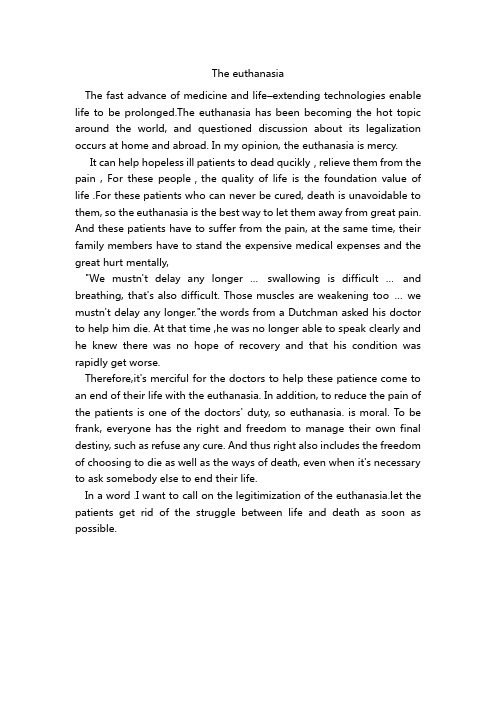
The euthanasiaThe fast advance of medicine and life–extending technologies enable life to be prolonged.The euthanasia has been becoming the hot topic around the world, and questioned discussion about its legalization occurs at home and abroad. In my opinion, the euthanasia is mercy.It can help hopeless ill patients to dead qucikly,relieve them from the pain , For these people,the quality of life is the foundation value of life .For these patients who can never be cured, death is unavoidable to them, so the euthanasia is the best way to let them away from great pain. And these patients have to suffer from the pain, at the same time, their family members have to stand the expensive medical expenses and the great hurt mentally,"We mustn't delay any longer …swallowing is difficult …and breathing, that's also difficult. Those muscles are weakening too …we mustn't delay any longer."the words from a Dutchman asked his doctor to help him die. At that time ,he was no longer able to speak clearly and he knew there was no hope of recovery and that his condition was rapidly get worse.Therefore,it's merciful for the doctors to help these patience come to an end of their life with the euthanasia. In addition, to reduce the pain of the patients is one of the doctors' duty, so euthanasia. is moral. To be frank, everyone has the right and freedom to manage their own final destiny, such as refuse any cure. And thus right also includes the freedom of choosing to die as well as the ways of death, even when it's necessary to ask somebody else to end their life.In a word .I want to call on the legitimization of the euthanasia.let the patients get rid of the struggle between life and death as soon as possible.。
安乐死的英文作文

安乐死的英文作文英文:Euthanasia, also known as assisted suicide or mercy killing, is a controversial topic that has been debated for decades. Some people believe that individuals who are terminally ill or suffering from unbearable pain should have the right to choose to end their own lives with the help of a physician. Others argue that euthanasia goes against the sanctity of life and can lead to abuse.Personally, I believe that euthanasia should be legalized under certain circumstances. For example, if a patient has a terminal illness and is in constant pain, they should have the right to end their suffering. However, strict regulations and guidelines must be put in place to prevent abuse and ensure that the patient is making an informed decision.In my opinion, the decision to end one's own life is adeeply personal one and should not be made lightly. It is important for the patient to have access to counseling and support to help them make an informed decision. Additionally, the physician who assists with the euthanasia should be well-trained and experienced in end-of-life care.中文:安乐死,也称为协助自杀或慈悲杀死,是一个备受争议的话题,已经争论了几十年。
支持安乐死英语作文

支持安乐死英语作文Title: The Case for Euthanasia: A Moral Imperative。
Euthanasia, also known as assisted suicide or mercy killing, has long been a topic of ethical debate worldwide. Proponents argue that it is a compassionate choice for individuals suffering from incurable illnesses or unbearable pain, granting them the dignity of a peaceful death. I firmly support euthanasia as a fundamental human right and a morally justifiable act for several reasons.Firstly, euthanasia respects individual autonomy and self-determination. Every person has the right to make decisions about their own life, including the right to end it if they are facing terminal illness or intolerable suffering. Denying individuals the option of euthanasia deprives them of their autonomy and forces them to endure unnecessary pain and indignity against their will.Secondly, euthanasia is a manifestation of compassionand empathy towards those who are suffering. It offers a humane way to alleviate the physical and emotional distress of patients who have exhausted all treatment options and face a grim prognosis. Allowing them to end their lives with dignity and without prolonged agony is an act of kindness and mercy.Moreover, euthanasia can prevent unnecessary financial and emotional burdens on both patients and their families. Terminal illnesses often require extensive medical care and resources, placing a significant strain on healthcare systems and exhausting the savings of individuals and families. By opting for euthanasia, patients can avoid prolonged hospital stays and expensive treatments, freeing up resources for others in need and sparing their loved ones from witnessing their prolonged suffering.Critics of euthanasia often raise concerns about the potential for abuse and the slippery slope towards involuntary euthanasia. However, strict safeguards and regulations can be implemented to ensure that euthanasia is only carried out with the explicit consent of mentallycompetent patients who are facing unbearable suffering with no hope of improvement. Medical professionals can be involved in the decision-making process to verify the patient's condition and ensure that all other options, such as palliative care, have been explored.Furthermore, legalizing euthanasia can lead to greater transparency and accountability in end-of-life care. Currently, patients may resort to clandestine methods or unregulated practices to end their suffering, putting themselves at risk of botched attempts or inadequate pain management. Legalizing euthanasia allows for proper oversight and regulation, ensuring that patients receive the necessary support and guidance in making their end-of-life decisions.In conclusion, euthanasia is a compassionate andethical choice that respects the autonomy, dignity, and suffering of individuals facing terminal illness or unbearable pain. By legalizing euthanasia and implementing appropriate safeguards, society can uphold the principles of compassion, autonomy, and dignity in end-of-life care.It is time to recognize euthanasia as a fundamental human right and provide individuals with the option of a peaceful and dignified death when faced with unbearable suffering.。
安乐死 Die With Pleasure(大学英语作文)
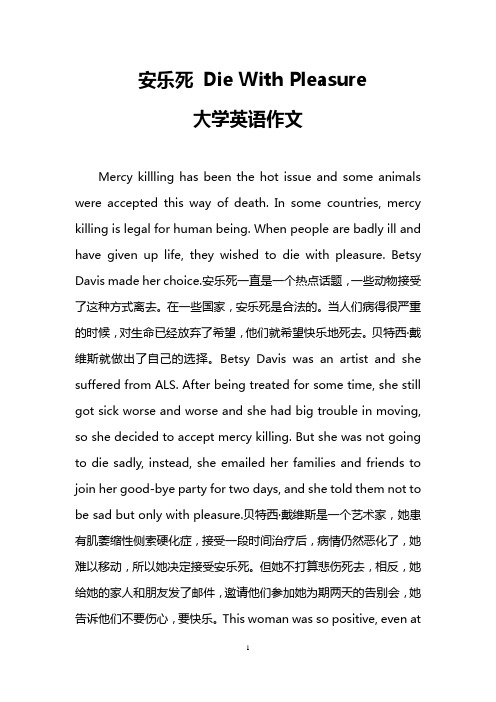
安乐死Die With Pleasure大学英语作文Mercy killling has been the hot issue and some animals were accepted this way of death. In some countries, mercy killing is legal for human being. When people are badly ill and have given up life, they wished to die with pleasure. Betsy Davis made her choice.安乐死一直是一个热点话题,一些动物接受了这种方式离去。
在一些国家,安乐死是合法的。
当人们病得很严重的时候,对生命已经放弃了希望,他们就希望快乐地死去。
贝特西·戴维斯就做出了自己的选择。
Betsy Davis was an artist and she suffered from ALS. After being treated for some time, she still got sick worse and worse and she had big trouble in moving, so she decided to accept mercy killing. But she was not going to die sadly, instead, she emailed her families and friends to join her good-bye party for two days, and she told them not to be sad but only with pleasure.贝特西·戴维斯是一个艺术家,她患有肌萎缩性侧索硬化症,接受一段时间治疗后,病情仍然恶化了,她难以移动,所以她决定接受安乐死。
安乐死 英语作文
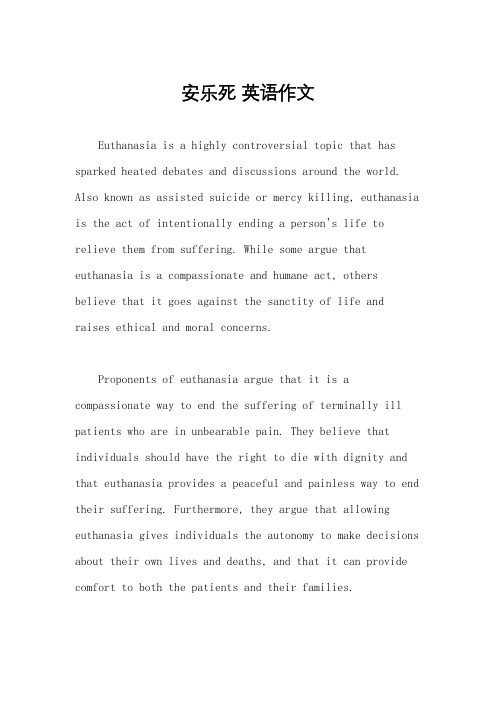
安乐死英语作文Euthanasia is a highly controversial topic that has sparked heated debates and discussions around the world. Also known as assisted suicide or mercy killing, euthanasia is the act of intentionally ending a person's life to relieve them from suffering. While some argue that euthanasia is a compassionate and humane act, others believe that it goes against the sanctity of life and raises ethical and moral concerns.Proponents of euthanasia argue that it is a compassionate way to end the suffering of terminally ill patients who are in unbearable pain. They believe that individuals should have the right to die with dignity and that euthanasia provides a peaceful and painless way to end their suffering. Furthermore, they argue that allowing euthanasia gives individuals the autonomy to make decisions about their own lives and deaths, and that it can provide comfort to both the patients and their families.On the other hand, opponents of euthanasia argue thatit goes against the fundamental principle of the sanctityof life. They believe that every human life is valuable and should be protected, and that euthanasia undermines the value of life. Additionally, they raise concerns about the potential for abuse and coercion in euthanasia cases, and the slippery slope that could lead to the devaluation of human life.In many countries, euthanasia is illegal and considered a criminal act. However, there are some countries andstates that have legalized euthanasia under certain circumstances. For example, in the Netherlands and Belgium, euthanasia is legal under strict regulations and guidelines, and patients must meet specific criteria in order toqualify for euthanasia. In the United States, severalstates have also legalized euthanasia, with Oregon beingthe first to do so in 1997.The legalization of euthanasia has sparked intense debates and discussions about the ethical, moral, and legal implications of this controversial practice. While someargue that euthanasia provides a compassionate and humane way to end the suffering of terminally ill patients, others believe that it goes against the sanctity of life and raises concerns about potential abuse and coercion.In conclusion, euthanasia is a complex and contentious issue that raises important ethical, moral, and legal questions. While proponents argue that it provides a compassionate way to end the suffering of terminally ill patients, opponents raise concerns about the value of life and the potential for abuse. As the debate over euthanasia continues, it is important to consider the perspectives of all stakeholders and carefully weigh the ethical, moral, and legal implications of this controversial practice.。
英文作文(安乐死)

Euthanasia should be illegalSubmitted by: XxxxxxEnglish WritingDecember 15, 2009OutlineThesis: Euthanasia should be illegal.(1)Introduction: the definition and general introduction of euthanasia is broughtabout.(2)The legality of euthanasia differs in different countries and more importanceshould be attached to ethics and moral principles.(3)From the aspect of ethics, we oppose the performing of euthanasia mainly for fourreasons.A.Some patients choose euthanasia just because of poverty.B.Some doctors may give up the efforts to save the sufferers if euthanasia ispermitted.C.The euthanasia may be used to murder the patients.D.No one should be denied the right to live.(4)A survey is introduced about people‟s attitude toward euthanasia.(5)Conclusion: euthanasia should be made illegal.Euthanasia should be illegalThe term …euthanasia‟ derives from the ancient Greek word euthanatos, meaning …easy death,‟ which combines eu …good‟ and thanatos …death‟. In Webster‟s dictionary euthan asia is defined as “the act or practice of killing or permitting the death of hopelessly sick or injured individuals (persons or domestic animals) in a relatively painless way for reasons of mercy”(Pestalozzi 263). Generally speaking, euthanasia is not a new problem, and until now, it is still a controversial issue. The euthanasia itself is a complex problem which covers so many fields, such as law, ethics, medical principle and so on.As to the legality of euthanasia, although euthanasia law was legalized in some west countries, such as Netherlands, which is the first country to make euthanasia legal, there is no definite legal provision to allow euthanasia in our country. To many of us, to perform euthanasia on the sufferer is no less than murdering. Of course, we have to admit that euthanasia can lessen the pain of the sufferer to a certain extent so that the patient can die without enduring so much pain. But, we should also realize that there are surely ethics and moral principles which we should attach more importance to.From the aspect of ethics, we oppose the performing of euthanasia mainly for four reasons. First, some sufferers, especially those in poverty, choose euthanasia just because they do not want the family to get involved into financial problems. As their family members, should we give up and see the one who are intimate to us die in desperate? The answer is of course not. What we should do is just to back them andencourage them. Second, if euthanasia is permitted, then some doctors may just give up the efforts to save the sufferer and abandon the patients to euthanasia, which may insult the essence and mission of the doctor. Third, in order to get the estates of the patients, the relatives of the sufferer and the doctor may take advantage of euthanasia to murder the patients. Fourth, life is given to us only once, thus, no one should be denied the right to die. Here, I would like to mention the euthanasia issue happened in Florida America. That is the story about Terri Schindler-Schiavo, who was in a condition of diminished consciousness since 1990. Although at last, she was disconnected from life support at the request of her husband, this event still drew much public attention and even the US government was involved (Wikipedia). Schindler-Schiavo has died, but the argumentation of her death and the argumentation about moral principles have not stopped.As to the attitudes towards euthanasia in general and attitudes towards legalization of euthanasia, doctor Radulovic and Mojsilovic had once made a survey among oncologists, home care physicians (family doctors), third-year medical students and lawyers. The result showed that more than half of the individuals (57%) were against euthanasia, and 61% are against the legalization of euthanasia (Radulovic and Mojsilovic 400-412). So, making efforts to reduce the pains of sufferer, trying our best to save the patient, showing more care to the patient, and improving the service of the hospital are really something more important than euthanasia.As to the legality of euthanasia, different people may have different opinions. But we should always believe that medical problems today may be solved tomorrow. Sothe sufferer should not be given up. As long as we have confidence, then everything is possible. Besides, euthanasia is to some extent against the ethics and is not widely accepted. So, euthanasia should be made illegal.Works cited:Pestalozzi, “Euthanasia: do we know it and do we need it?”, Support Care Cancer, no.10 (April 2002):263-264.Radulovic, Mojsilovic, “Attitudes of oncologists, family doctors, medical students and lawyers to euthanasia”, Support Care Cancer, no.6 (1998):410-415Terri Schiavo case, Wikipedia, /wiki/Terri_Schiavo: Accessed December 18, 2009。
安乐死英文精选全文
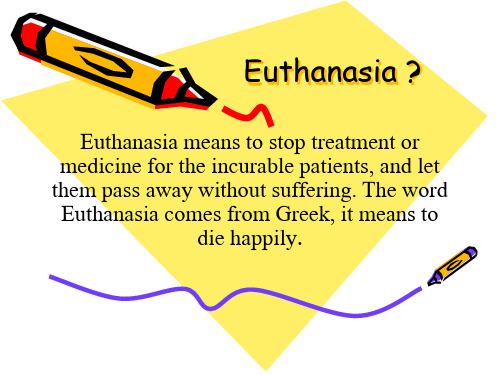
30%
recent years.
20%
10%
0%
1947
1973
1983 recent
years
Part 3:But at the same time there
are many people disagree this
They keesonal
die happily.
Phenomenon
Reasons for support Another attitude Summary
Phenomenon
• Now there are a lot of people have an incurable disease. They want to be part of people with euthanasia over his own life. But it is not allowed ……
安乐死英语小论文Euthanasia
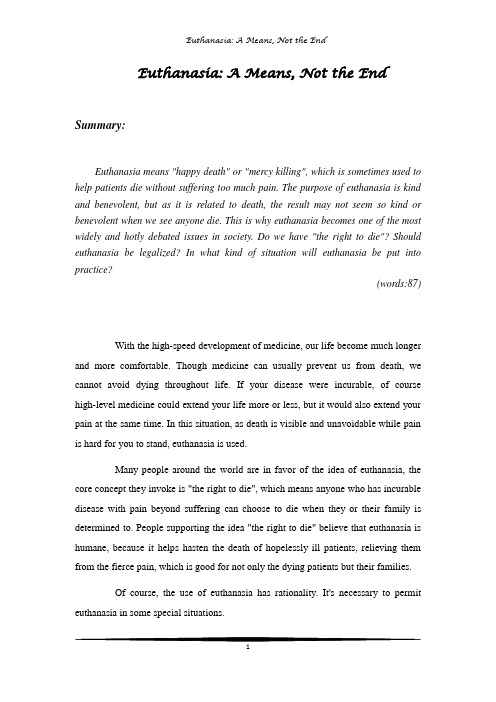
Euthanasia: A Means, Not the End Summary:Euthanasia means "happy death" or "mercy killing", which is sometimes used to help patients die without suffering too much pain. The purpose of euthanasia is kind and benevolent, but as it is related to death, the result may not seem so kind or benevolent when we see anyone die. This is why euthanasia becomes one of the most widely and hotly debated issues in society. Do we have "the right to die"? Should euthanasia be legalized? In what kind of situation will euthanasia be put into practice?(words:87)With the high-speed development of medicine, our life become much longer and more comfortable. Though medicine can usually prevent us from death, we cannot avoid dying throughout life. If your disease were incurable, of course high-level medicine could extend your life more or less, but it would also extend your pain at the same time. In this situation, as death is visible and unavoidable while pain is hard for you to stand, euthanasia is used.Many people around the world are in favor of the idea of euthanasia, the core concept they invoke is "the right to die", which means anyone who has incurable disease with pain beyond suffering can choose to die when they or their family is determined to. People supporting the idea "the right to die" believe that euthanasia is humane, because it helps hasten the death of hopelessly ill patients, relieving them from the fierce pain, which is good for not only the dying patients but their families.Of course, the use of euthanasia has rationality. It's necessary to permit euthanasia in some special situations.However, there are also many disadvantages of euthanasia. First, euthanasia can be abused when doctors is treating disabled people and old people, which leads to crime. Second, when a seriously-ill patient is determined to take euthanasia, he may not make clear-headed decision because his consciousness is probably muddled. Third, too many examples of euthanasia may result in social moral crisis and doctors may not try their best to cure a dying patient once they have the power to practice euthanasia. This conduct is nothing less than murdering.In order to prevent the abuse of euthanasia, we must strictly standard ize the application of euthanasia. So, when can doctor use euthanasia legally? I think it depends on several conditions.First of all, euthanasia can be only practiced on terminally ill patients, when the practice of euthanasia serves only to hasten death. Secondly, we should guarantee the earnest and strictness of euthanasia, so taking euthanasia need the permission of patient himself or his family, the acceptance of doctors and the certificate from court. Thirdly, the method to practice euthanasia must conform to humanitarianism, and only professional and qualified doctor can practice euthanasia. Finally, legal euthanasia can't betray its original purpose. Euthanasia is a merciful way to end patients' life. Doctors practice euthanasia in order that the patients will no longer suffer a fierce pain. Euthanasia can make the patients die peacefully. To some extent, it is a kind of respect to human life.Euthanasia has come into being for a long time, it's impossible and groundless to forbid it completely. I think it won't be long to legalize euthanasia in China, what we should do is to make the law on euthanasia as perfect as possible.Anyhow, we shouldn't regard euthanasia as a painless way to commit suicide, and there is no reason for us to take it for granted that euthanasia is a good way to terminate our life. Y ou cannot expect euthanasia to bring you any relief as it seems, the only thing euthanasia can do is take your pain with your life. After all, life is the most precious treasure we have.In fact, to terminate one's life by taking euthanasia is not only a legal issue but also a moral issue because it refers to a choice between painfully liv ing and comfortably dying. Which one would you choose? Just like what Confucius said: "It's useless talking about death before you understand life clearly."[1]According to Confucius's words, it's useless talking about choosing how to die while we haven't settled the problems of life. So should we pay too much attention on "the right of death" while we still can't guarantee the rights of life? Is it the time for us to focus more on those people who are alive?(words:655) [1] 出自《论语·先进》:孔子云:“未知生,焉知死?”Reference:1.Y e Gaofeng. "A Law View on Euthanasia",The Issues and Disputes of Penal Law . 1(2001): 3992.Zhang Yutang. "Do We Have right to die?" Law. 5(2001): 333.Wu Jing. "Euthanasia Is Not Crime", The Issues and Disputes of Penal Law. 1(2000): 1134.Wang Xiaohui. To Discuss Euthanasia. Jilin People's Press5.Chu Dongping. Euthanasia. Shanghai. Culture Press, 1988。
英文摘要范文(安乐死)

Writing (40 minutes)Directions:In this part there is an essay in Chinese.Read it carefully and then write a summary of at least 200 words in English on the ANSWER SHEET.Make sure that your summary covers all the major points of the article.长期以来,我国传统医德把“救人活命”、“延年益寿”当作医生唯一职责,认为医学的目的是维持生命,即使最低的生命质量也应不惜代价去延续它,这种道义主义偏重生命的数量,而不顾及生命的价值和效果。
我们认为,救死扶伤应该是指那些有存活意义的生命,对于拯救绝症垂死的生命,那只是一个善良的愿望,并无任何积极意义。
医务人员不惜一切代价,借助现代医疗设备,维护病人的心跳和呼吸,延长一个无价值的生命,表面上看来实行了人道主义,合乎医学伦理道德,实际上却是无谓地延长和加重了病人的痛苦。
安乐死作为满足绝症病人“无痛致死”愿望的一种临终处置方法,它不是授人以死,而是授死者以安乐,它不是死亡的直接原因和性质,而是死亡过程中的一种良好状态。
安乐死的本质不是决定“生与死”,而是决定垂死病人死亡的过程是“痛苦死”还是“安乐死”,它的目的在于使必死的病人无痛苦地死去,提高生命末端的质量,体面地、有尊严走向死亡。
因此,安乐死不是非人道的“变相杀人”,它蕴含着极高的伦理道德意义。
首先,实施安乐死符合病人的自身利益。
对于身患绝症,临近死亡、肉体极度痛苦的病人应其本人的恳求予以安乐死,它并没有改变病人必死的结局,只是改变了病人继续忍受和延长毫无意义的痛苦的命运,是对病人选择死亡的时间和方式、以尽早摆脱肉体痛苦和精神折磨的权利的:尊重和保障。
因此,实施安乐死,是在特定情况下病人的最高利益的体现,符合医学伦理道德的基本要求。
支持安乐死的英语作文
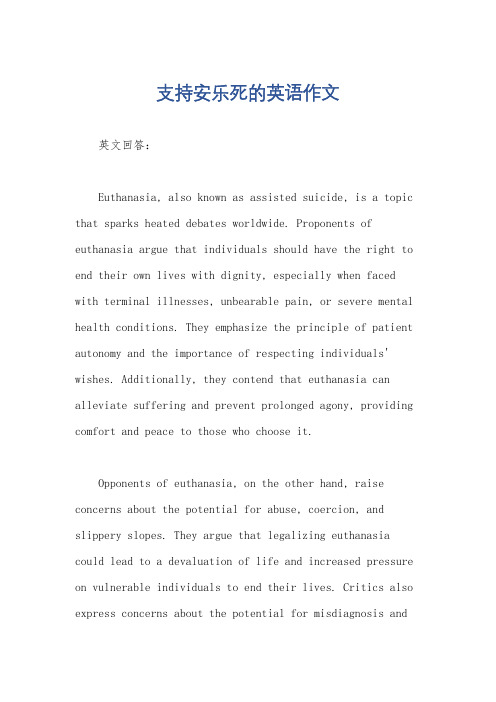
支持安乐死的英语作文英文回答:Euthanasia, also known as assisted suicide, is a topic that sparks heated debates worldwide. Proponents of euthanasia argue that individuals should have the right to end their own lives with dignity, especially when faced with terminal illnesses, unbearable pain, or severe mental health conditions. They emphasize the principle of patient autonomy and the importance of respecting individuals' wishes. Additionally, they contend that euthanasia can alleviate suffering and prevent prolonged agony, providing comfort and peace to those who choose it.Opponents of euthanasia, on the other hand, raise concerns about the potential for abuse, coercion, and slippery slopes. They argue that legalizing euthanasia could lead to a devaluation of life and increased pressure on vulnerable individuals to end their lives. Critics also express concerns about the potential for misdiagnosis andmistakes, emphasizing the need for extreme caution and a robust regulatory framework. Furthermore, they argue that euthanasia undermines the role of palliative care and hospice services, which focus on providing comfort and pain management without ending life.In many countries, the legal status of euthanasia varies. Some jurisdictions have legalized euthanasia under strict conditions, while others prohibit it entirely. In the United States, for example, euthanasia is generally illegal, but certain states have legalized physician-assisted suicide under specific circumstances.The debate surrounding euthanasia is complex and involves a range of ethical, legal, medical, and religious considerations. There are valid arguments on both sides of the issue, and it is a matter that requires careful deliberation and compassionate dialogue.中文回答:安乐死。
关于安乐死的英语作文
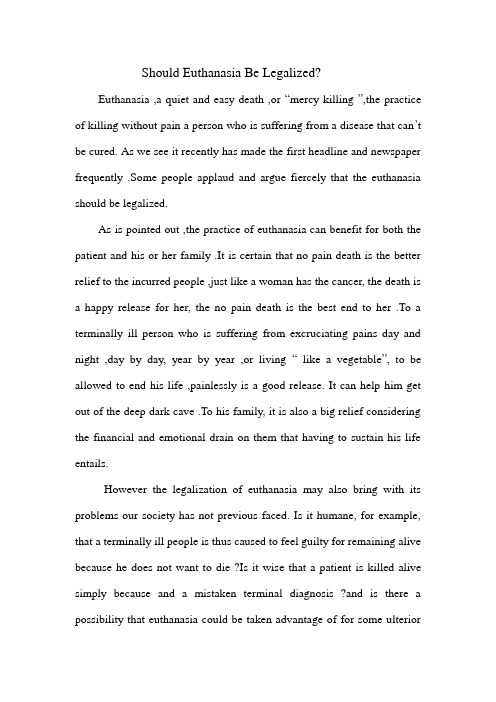
Should Euthanasia Be Legalized?Euthanasia ,a quiet and easy death ,or “mercy killing ”,the practice of killing without pain a person who is suffering from a disease that can’t be cured. As we see it recently has made the first headline and newspaper frequently .Some people applaud and argue fiercely that the euthanasia should be legalized.As is pointed out ,the practice of euthanasia can benefit for both the patient and his or her family .It is certain that no pain death is the better relief to the incurred people ,just like a woman has the cancer, the death is a happy release for her, the no pain death is the best end to her .To a terminally ill person who is suffering from excruciating pains day and night ,day by day, year by year ,or living “like a vegetable”, to be allowed to end his life ,painlessly is a good release. It can help him get out of the deep dark cave .To his family, it is also a big relief considering the financial and emotional drain on them that having to sustain his life entails.However the legalization of euthanasia may also bring with its problems our society has not previous faced. Is it humane, for example, that a terminally ill people is thus caused to feel guilty for remaining alive because he does not want to die ?Is it wise that a patient is killed alive simply because and a mistaken terminal diagnosis ?and is there a possibility that euthanasia could be taken advantage of for some ulterioror even criminal purposes.Since the legalization of euthanasia is concerned about the moral and social issues, the decision of society make about euthanasia will undoubtedly and absolutely have great consequences in society.。
安乐死英文资料Euthanasia

Euthanasia is to kill people. Life is so important for every one. People don’t only live for themselves, but they also live for their families and the society. If they choose to leave the world, they are not responsible for themselves, their families and the society.Euthanasia is disparagement of life. Life is so precious. Patients should cherish their life. They should try their best to prevail incurable disease. Everyone should show basic respect for life. No matter what happens, we should face up to the facts, we should live on with great courage, we should believe in wonder. Nothing is impossible.Euthanasia stops the medicine developing. If the patients require using euthanasia, doctors won’t try their best to save patients. The medicine will stop p rogress. If making euthanasia is made legal, patients who use euthanasia will be protected by law. The doctors’ right will be obvious. Doctors are given too much power, and can be wrong or unethical. Patients put their faith and trust in the opinions of their doctor.people abuse euthanasia when it is legalized, it can harm people lives. In the name of euthanasia, carry out committing suicide. Miracle cures or recoveries can occur. You can never underestimate the power of the human spirit.It demeans the value of human life. In this country, human life means something.It could open the floodgates to non-critical patient suicides and other abuses. Any loosening of the assisted-suicide laws could eventually lead to abuses of the privilege.Many religions prohibit suicide and the intentional killing of others. The most basic commandment is "You shall not kill".Insurance companies may put undue pressure on doctors to avoid heroic measures or recommend the assisted-suicide procedure. Health insurance providers are under tremendous pressure to keep premiums down.Euthanasia can become a means of health care cost containment..Physicians and other medical care people should not be involved in directly causing death. Mercy killing is morally incorrect and should be forbidden by law.It's a homicide and murdering another human cannot be rationalized under any circumstances.Human life deserves exceptional security and protection. Advanced medical technology has made it possible to enhance human life span and quality of life. Palliative care and rehabilitation centers are better alternatives to help disabled or patients approaching death live a pain-free and better life.Family members influencing the patient's decision into euthanasia for personal gains like wealth inheritance is another issue. There is no way you can be really sure if the decision towards assisted suicide is voluntary or forced by others.Mercy killing would cause decline in medical care and cause victimization of the most vulnerable society. Would mercy killing transform itself from the "right to die" to "right to kill"?How would one assess whether a disorder of mental nature qualifies mercy killing? What if the pain threshold is below optimum and the patient perceives the circumstances to be not worthy of living? How would one know whether the wish to die is the result of unbalanced thought process or a logical decision in mentally ill patients? What if the individual chooses assisted suicide as an option and the family wouldn't agree?As to face the parting, helplessness, loss of self-control, fear of death and sorrow and so the majority of patients will experience mental suffering. In this psychological requirement under the "Euthanasia", we can say that he is reasonable? "According to the study of suicide, suicide andtreatable mental illness is intrinsically related, but not the fatal disease, a study found that in 44 patients with advanced cancer, only three thought about suicide, but are there is a serious depression. Another study shows that 85 suicides, only one person suffering from terminal illness, and 90-100% of the suicides were suffering from obvious mental illness.Undeniably, the modern medical practice slow death process, often cited the loss of personal characteristics of patients Mei, dignity, independence and autonomy.However, the expression of active euthanasia as acts of personal autonomy, it is wrong. Reasons: (a) Since active euthanasia need help, then it is not an individual matter, but the open or in the public thing.(B) under the public recognition to self-defense, capital punishment and justice in the form of war, murder, only to defend the life for everyone, not to the benefit of those killed. So, even if death is painful relief, can not be lightly taken away the right to life committed to personal. (C) even if the person'sself-determination recognized the right to choose to die, that does not mean the right to ask others to kill themselves, does not include the right to authorize self to kill others. (D) autonomy, including the right of slavery has never been their own, in other words, the right to freedom does not mean the right not to freedom.So to maintain the autonomy, the need to protect life, to give others their right to life is not trampling the principle of maintaining independence. Therefore, individual autonomy and social need and public objectives and values to be consistent.active euthanasia may gradually lose its spontaneity, and thus out of (i) "secret euthanasia", meaning that without their own consent, to be a doctor euthanized. (Ii) "forced euthanasia", meaning patients suffering from terminal illness would be coercion to lure choose euthanasia to relieve their families in the economic and psychological pressures, and save limited resources of society, the patients chose to die, do not feel life is a burden or tired of life, but he felt the burden of someone else, and that others dislike. (Iii) "Deputy euthanasia" means to allow patients who lack capacity to self-determination by the people "proxy decision" to euthanasia. (Iv) "Discrimination against euthanasia," the crisis is the number of types of patients such as the poverty stricken or belonging to ethnic minorities, may be "clever" to force that "euthanasia" requirement, the mercy of others. Made ill patients caught in the dilemma of both the opposition between the yield, resulting in additional unnecessary fear and anxiety. The information may be heard: "Death is terrible! Your best choice of euthanasia."of the slip waves, is once the "euthanasia" is legalized, its use will inevitably extend to other types of patients but not the dying, if not cure patients, but not incurable disease, then the risk of Alzheimer's disease or brain degradation, even those born with severe disabilities Down syndrome baby. . And so on. So, if this argument, once established, will only create panic and fear that they will be forcibly sent to "euthanasia" in the ranks. Therefore, I agree Frasen say, "human life, merely the possibility of error, is enough to completely reject the" euthanasia. " "。
安乐死的英语作文
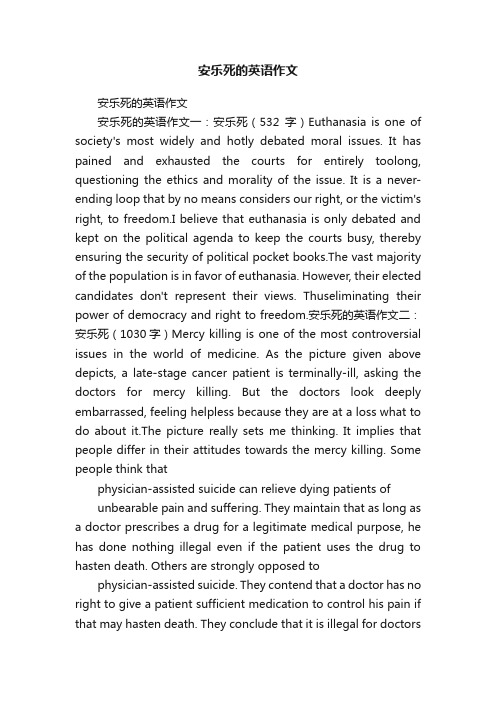
安乐死的英语作文安乐死的英语作文安乐死的英语作文一:安乐死(532字)Euthanasia is one of society's most widely and hotly debated moral issues. It has pained and exhausted the courts for entirely toolong, questioning the ethics and morality of the issue. It is a never-ending loop that by no means considers our right, or the victim's right, to freedom.I believe that euthanasia is only debated and kept on the political agenda to keep the courts busy, thereby ensuring the security of political pocket books.The vast majority of the population is in favor of euthanasia. However, their elected candidates don't represent their views. Thuseliminating their power of democracy and right to freedom.安乐死的英语作文二:安乐死(1030字)Mercy killing is one of the most controversial issues in the world of medicine. As the picture given above depicts, a late-stage cancer patient is terminally-ill, asking the doctors for mercy killing. But the doctors look deeply embarrassed, feeling helpless because they are at a loss what to do about it.The picture really sets me thinking. It implies that people differ in their attitudes towards the mercy killing. Some people think thatphysician-assisted suicide can relieve dying patients ofunbearable pain and suffering. They maintain that as long as a doctor prescribes a drug for a legitimate medical purpose, he has done nothing illegal even if the patient uses the drug to hasten death. Others are strongly opposed tophysician-assisted suicide. They contend that a doctor has no right to give a patient sufficient medication to control his pain if that may hasten death. They conclude that it is illegal for doctorsto help the dying end their lives.As far as I’m concerned, doctors have a duty to help dying patients to alleviate their pain and suffering. I also agree that doctors deserve to be punished if they prolong the needless suffering of their terminally-ill patients. In short, I am in favor of mercy killing.安乐死的英语作文三:安乐死(815字)The fast advance of medicine and life–extending technologies enable life to be prolonged 。
我对于安乐死的观点英语作文
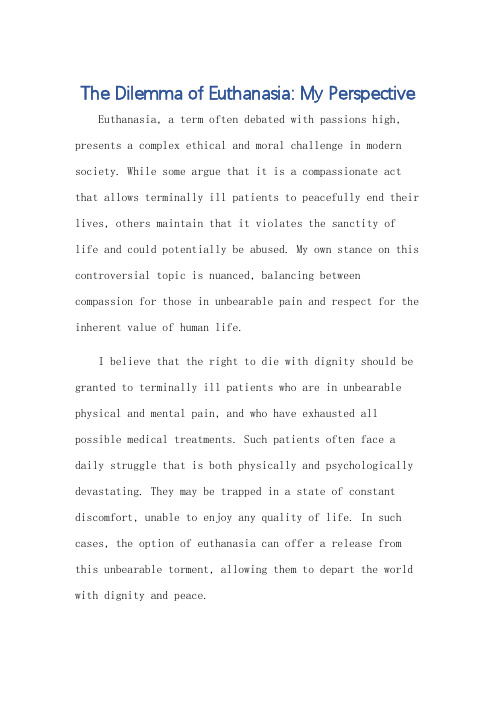
The Dilemma of Euthanasia: My Perspective Euthanasia, a term often debated with passions high, presents a complex ethical and moral challenge in modern society. While some argue that it is a compassionate act that allows terminally ill patients to peacefully end their lives, others maintain that it violates the sanctity oflife and could potentially be abused. My own stance on this controversial topic is nuanced, balancing between compassion for those in unbearable pain and respect for the inherent value of human life.I believe that the right to die with dignity should be granted to terminally ill patients who are in unbearable physical and mental pain, and who have exhausted all possible medical treatments. Such patients often face a daily struggle that is both physically and psychologically devastating. They may be trapped in a state of constant discomfort, unable to enjoy any quality of life. In such cases, the option of euthanasia can offer a release from this unbearable torment, allowing them to depart the world with dignity and peace.However, I am firmly opposed to the legalization of euthanasia without strict regulations and thorough safeguards. The fear of abuse is real, and it is imperative that we ensure that euthanasia is not misused as a means to eliminate the elderly or infirm, or as a way to avoid the financial and emotional burdens of caring for a loved one. Strict eligibility criteria must be established, and there must be a robust system of checks and balances to prevent any misuse of the law.Moreover, I believe that euthanasia should only be considered as a last resort, after all other avenues have been explored. This includes providing comprehensive palliative care and support to patients and their families, ensuring that they are not left to face their ordeal alone. Palliative care aims to improve the quality of life of patients by relieving their symptoms and addressing their emotional and spiritual needs. It is a holistic approach that should be a cornerstone of any euthanasia debate.In addition, I主张对于安乐死的讨论和教育应该更加普及和深入。
我对于安乐死的观点英语作文

我对于安乐死的观点英语作文The concept of euthanasia, often dubbed as the 'right to die,' has been a hotly contested subject that stirs deep emotional and ethical debates. It's a topic that doesn't just challenge our medical practices but also our very understanding of life and death. For some, euthanasia represents a compassionate end to unbearable suffering, a humane choice for those who are terminally ill and wish to avoid a prolonged, painful demise. It's about autonomy, the right of an individual to make decisions about their own body and life, even if it means choosing to end it.On the other hand, the notion of euthanasia raises profound moral and legal questions. It's not just about the sanctity of life but also the slippery slope of where such a practice could lead. What safeguards are in place to prevent abuse? How do we ensure that the decision for euthanasia is truly voluntary and not influenced by external pressures? These are not trivial concerns, but rather the very heart of the debate.As I ponder on this, I find myself oscillating between the two sides. The empathy for those in chronic pain and the desire to alleviate their suffering is undeniable. Yet, the fear of setting a precedent that could be exploited is equally compelling. It's a delicate balance between respecting individual rights and protecting society from potential misuse of such a powerful decision.The complexity of this issue is further compounded by cultural, religious, and personal beliefs. While some may see euthanasia as an act of mercy, others view it as an affront to the natural order of life. It's a reflection of our diverse perspectives on what it means to live and die with dignity.In my view, the conversation around euthanasia should not be about binary choices but about nuanced understanding. It calls for a society that can engage in open dialogue, acknowledging the complexity of human suffering and the right to self-determination. It's about creating a framework that respects individual autonomy while ensuring that the decision to end one's life is made with the utmost care and consideration.Ultimately, the debate on euthanasia is not just about the end of life but about the values we hold as a society.It's a reflection of how we choose to navigate the delicate line between compassion and control, between the sanctity of life and the relief of suffering. It's a conversation that deserves our utmost attention, empathy, and wisdom.。
英文议论文:安乐死 On euthanasia
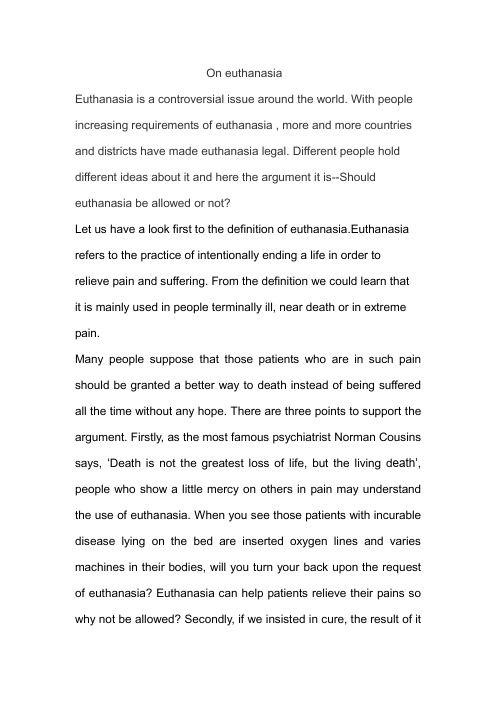
On euthanasiaEuthanasia is a controversial issue around the world. With people increasing requirements of euthanasia , more and more countries and districts have made euthanasia legal. Different people hold different ideas about it and here the argument it is--Should euthanasia be allowed or not?Let us have a look first to the definition of euthanasia.Euthanasia refers to the practice of intentionally ending a life in order to relieve pain and suffering. From the definition we could learn that it is mainly used in people terminally ill, near death or in extreme pain.Many people suppose that those patients who are in such pain should be granted a better way to death instead of being suffered all the time without any hope. There are three points to support the argument. Firstly, as the most famous psychiatrist Norman Cousins says, ‘Death is not the greatest loss of life, but the living d eath’, people who show a little mercy on others in pain may understand the use of euthanasia. When you see those patients with incurable disease lying on the bed are inserted oxygen lines and varies machines in their bodies, will you turn your back upon the request of euthanasia? Euthanasia can help patients relieve their pains so why not be allowed? Secondly, if we insisted in cure, the result of itwould not be so satisfied to some extent. For example, children who suffered from polio~~~(各种后遗症,但这个例子仿佛不太恰当的样子orz)And also, 有些人会将其与人权划勾,但当一个人无法拥有意识,连生和死都决定不了,何来权力?(翻译无能orz)Others hold the opinion that euthanasia should be banned like the majority of countries do. It is reasonable to have such an appeal. Some people against the euthanasia because lives are so valuable that we do not have any right to end other lives at random. As an old saying goes, ‘a living dog is better than a dead lion’. Life is full of opportunities and possibilities, and all we should do is to keep it and never give it up. After all, to live is better than to die. Some people think the use of euthanasia is a kind of ‘murder’ which ends other lives in a subjective way. Although those patients who suffer from severe disease are painful, they may be still optimistic about their situation. It is one-sided and unfair to end others’lives as a bystander. What’s more, since euthanasia is not legalized that is not easy to get, which means it contains enormous business opportunities for the wrong crowd, some patients only buy it through illegal channels, resulting in a series of illegal profit chain. From my perspective, I。
对安乐死的看法英语作文

对安乐死的看法英语作文English:I believe that euthanasia, or assisted suicide, is a complex and controversial issue. On one hand, it can be seen as a compassionate choice for individuals who are suffering from terminal illness and wish to end their lives on their own terms. It can also be viewed as a way to alleviate the emotional and financial burden on their families. However, on the other hand, there are ethical and moral considerations surrounding the intentional ending of a person's life, regardless of the circumstances. There are also concerns about the potential for abuse and coercion in the practice of euthanasia. Ultimately, I believe that the focus should be on improving palliative care and providing support for individuals facing terminal illnesses, rather than legalizing euthanasia as a solution.中文翻译:我认为安乐死,或者辅助自杀,是一个复杂而有争议的问题。
- 1、下载文档前请自行甄别文档内容的完整性,平台不提供额外的编辑、内容补充、找答案等附加服务。
- 2、"仅部分预览"的文档,不可在线预览部分如存在完整性等问题,可反馈申请退款(可完整预览的文档不适用该条件!)。
- 3、如文档侵犯您的权益,请联系客服反馈,我们会尽快为您处理(人工客服工作时间:9:00-18:30)。
考研英语写作30篇范文:安乐死
范文(八)
Writing (图画提纲式议论文)
Directions: Study the following picture carefully and write an essay of 160 - 200 words in which you should
1) describe the picture.
2) state different views on mercy killing, and
3) give your opinion on it.
晚期癌症病人请求安乐死。
我们怎么办?
范文
Mercy killing is one of the most controversial issues in the world of medicine. As the picture given above depicts, a late-stage cancer patient is terminally-ill, asking the doctors for mercy killing. But the doctors look deeply embarrassed, feeling helpless because they are at a loss what to do about it.
The picture really sets me thinking. It implies that people differ in their attitudes towards the mercy killing. Some people think that physician-assisted suicide can relieve dying patients of unbearable pain and suffering. They maintain that as long as a doctor prescribes a drug for a legitimate medical purpose, he has done nothing illegal even if the patient uses the drug to hasten death. Others are strongly opposed to physician-assisted suicide. They contend that a doctor has no right to give a patient sufficient medication to control his pain if that may hasten death. They conclude that it is illegal for doctors to help the dying end their lives.
As far as I'm concerned, doctors have a duty to help dying patients to alleviate their pain and suffering. I also agree that doctors deserve to be punished if they prolong the needless suffering of their terminally-ill patients. In short, I am in favor of mercy killing. (207 words)
译文:
安乐死是医学界最有争议的问题之一。
正如上面所示的画所描绘的,一位晚期癌症病人病入膏肓,请求医生们实施安乐死。
但医生们看上去十分尴尬,感到无能为力,因为他们不知道该怎么办。
这幅画确实发人深省。
它暗示,人们在对待安乐死上看法不一致。
有些人认为,医助自杀可以减轻垂死病人不堪忍受的痛苦。
他们主张,只要医生开药是为了合法的医疗目的,那么即使病人使用这种药物加速了死亡,医生也没有做什么违法的事。
其他人则强烈反对医助自杀。
他们坚持认为,医生无权给病人开足以控制痛苦的药物,如果那样做会加速死亡的话。
他们的结论是,医生帮助垂危病人结束生命是违法的。
依我看,医生有义务帮助垂死病人缓解病痛。
我还认为,如果医生延长了垂死病人不必要的痛苦的话,那他们应该受到惩处。
总之,我赞成安乐死。
